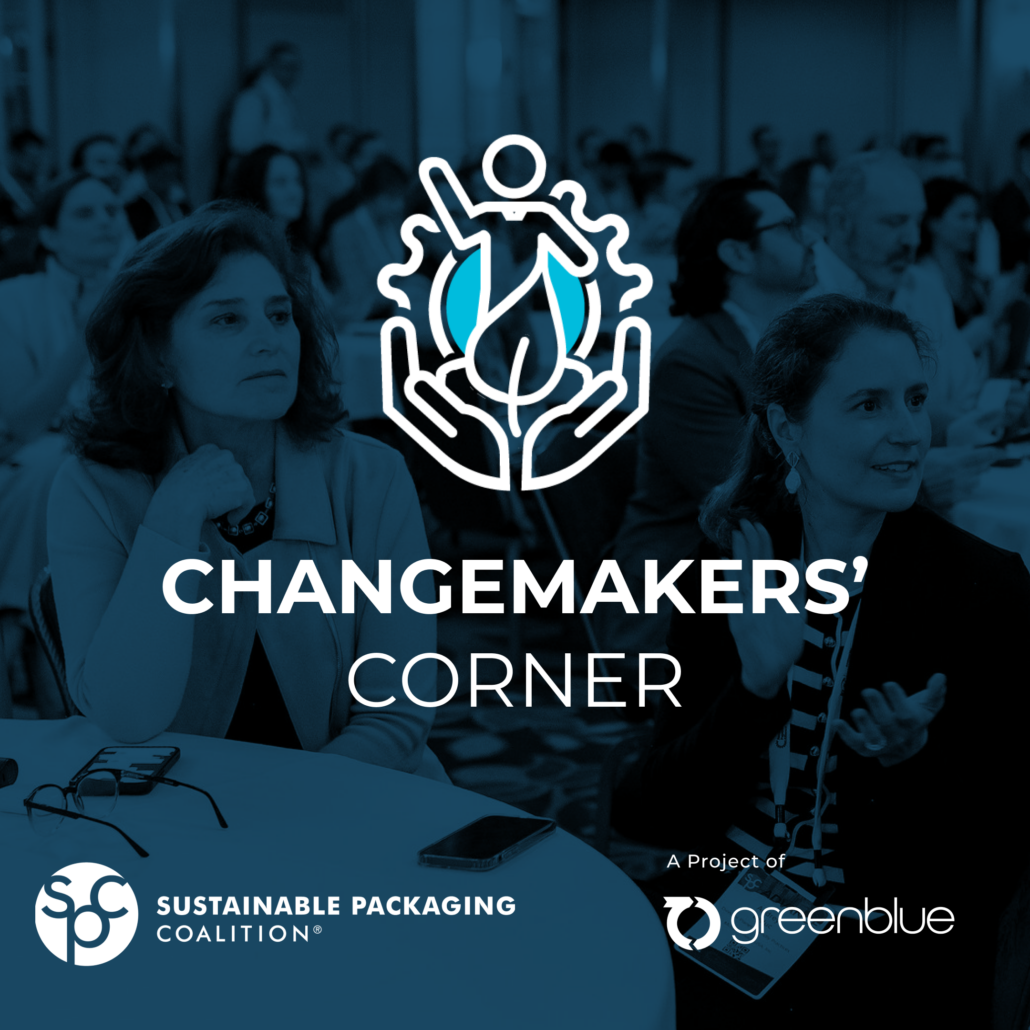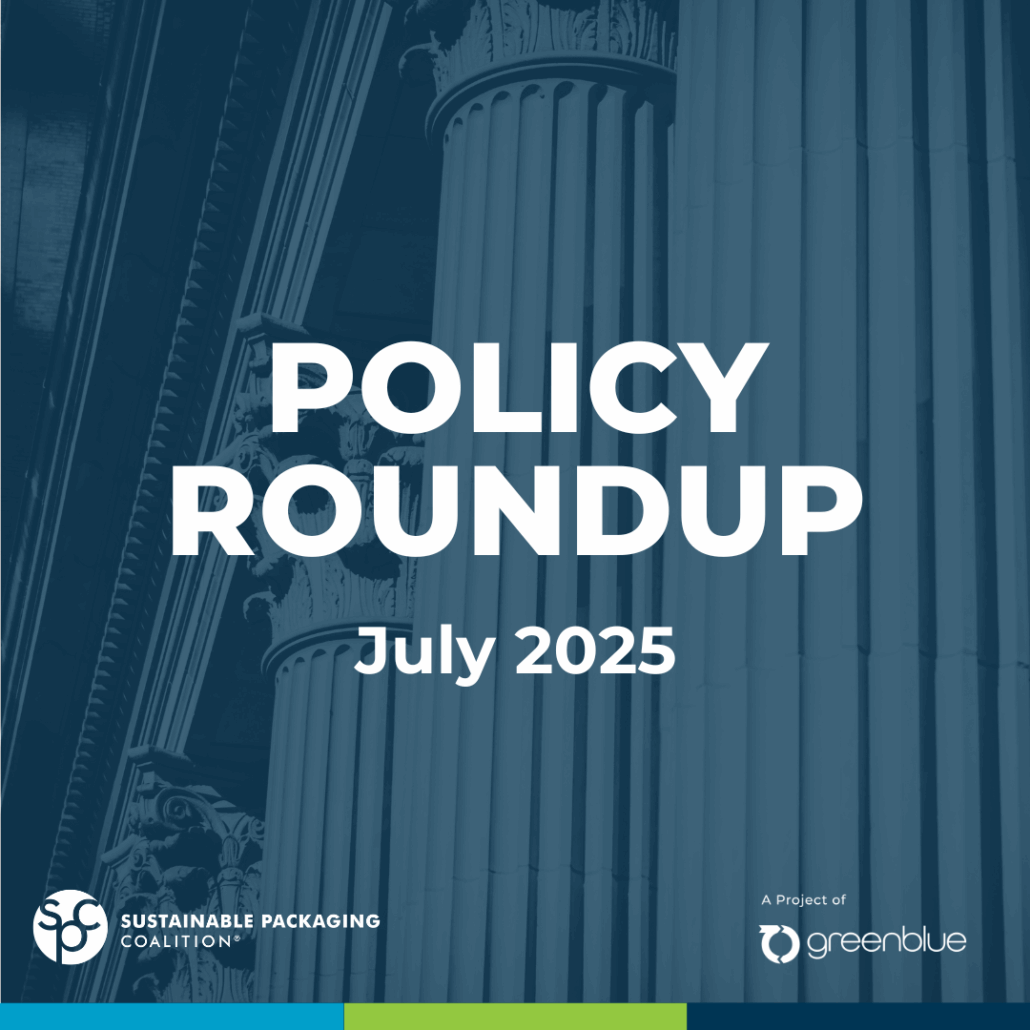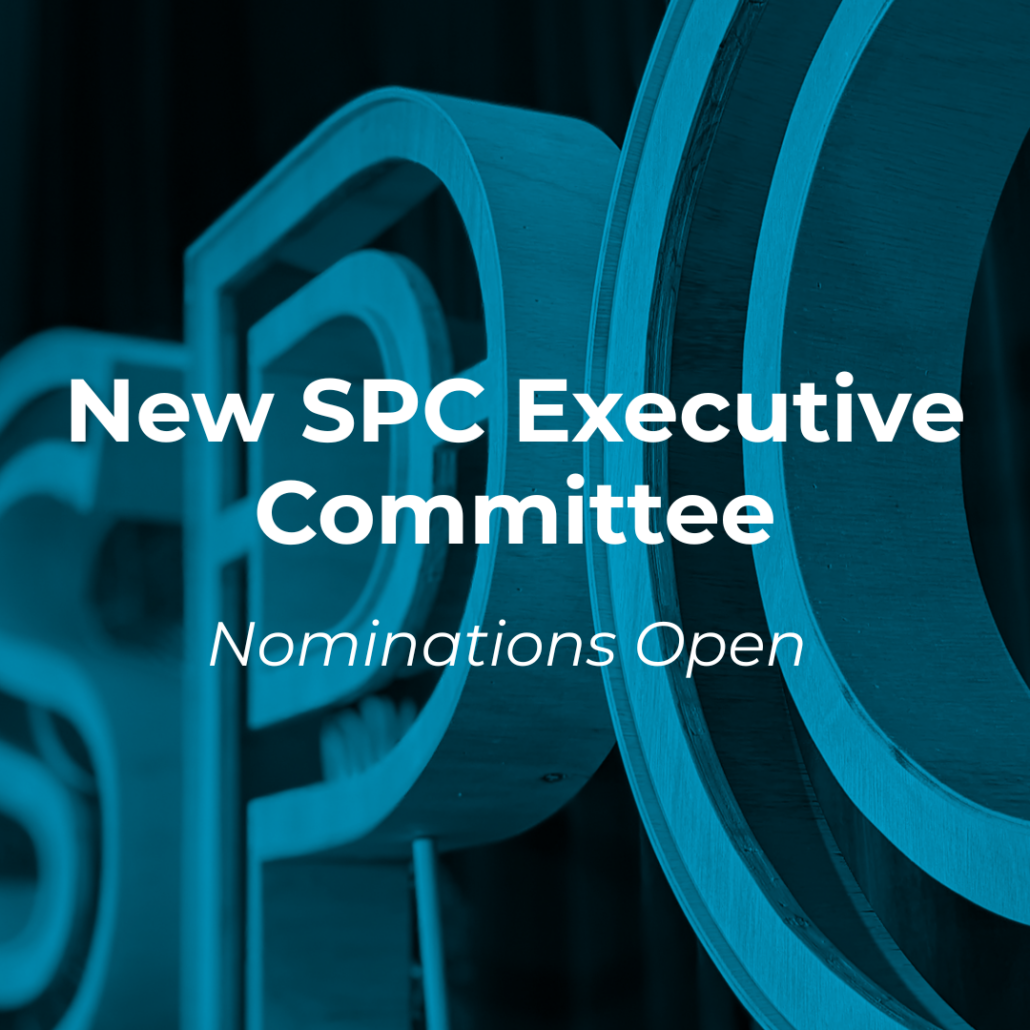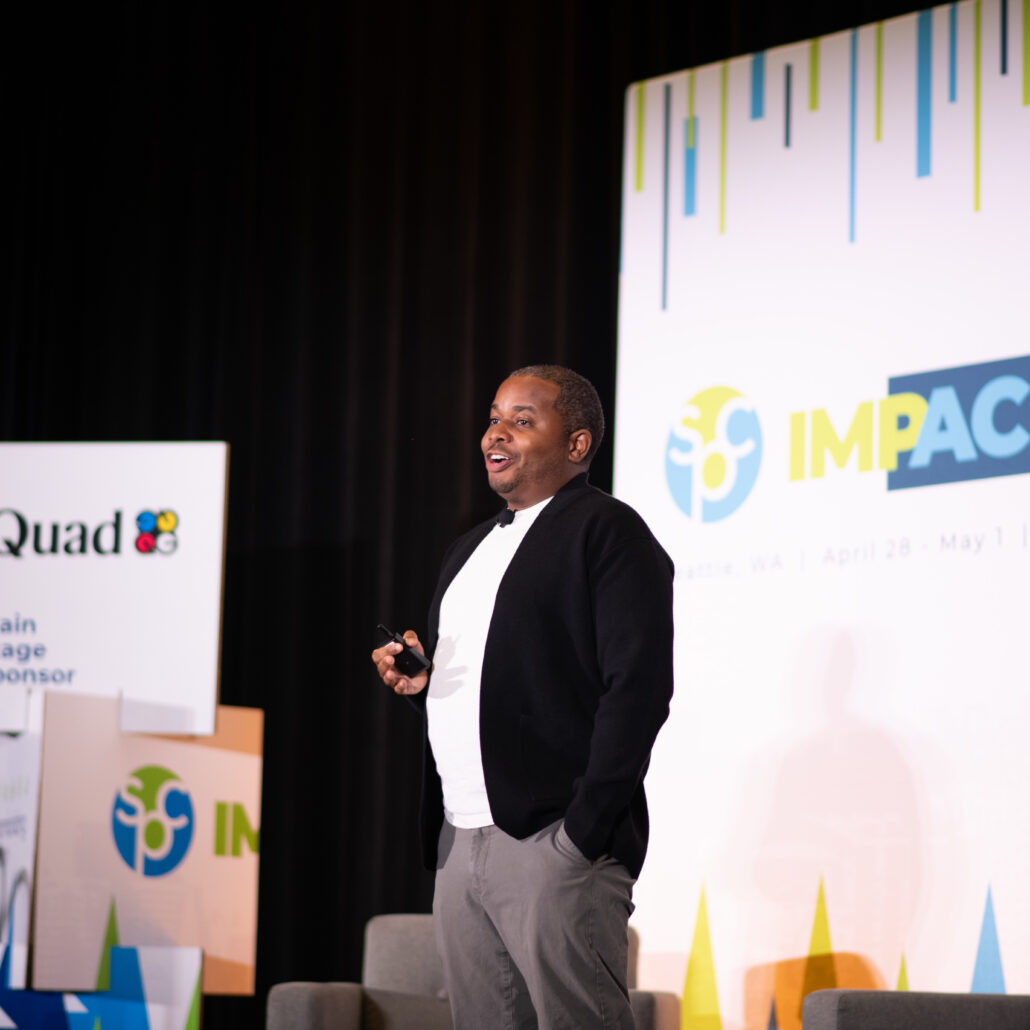June 2025 edition
What do cardboard Olympic beds, lotion pumps, and recycling labels have in common? They’re all proof that SPC members are raising the bar for sustainable packaging.
From Smurfit Westrock’s recyclable pallet wraps to Costco’s use of How2Recycle® labels, SPC members are shaping the future of sustainable packaging. In this edition of the Changemakers’ Corner, let’s explore some of the latest strides in sustainable packaging across the SPC community.
Built for Change: Smurfit Westrock Raised the Recyclability Bar
Remember those recyclable cardboard bed frames for athletes at the Paris Olympic Games? Those sustainable sleepers are just the tip of the sustainable packaging iceberg for SPC member Smurfit Westrock. In its annual report, the company shared some serious sustainability highlights for 2024, such as:
- Protecting more than 1,400 species in partnership with WWF Colombia
- Consuming 14 million tons of recovered fiber to keep valuable materials in circulation
- Earning 106 awards in categories such as packaging design, innovation and sustainability
Plus, they’re blazing new trails on sustainable packaging: Earlier this year, Smurfit Westrock made headlines with the launch of a recyclable paper pallet wrap, which can be used to replace single-use plastic pallet wraps in shipments.
Costco Championed Big Cuts with Bigger Impacts
Costco is trimming packaging the way it trims costs for consumers — with efficiency and big impact. Costco has set some bold sustainability goals in recent years, and now we’re proud to see that they’ve backed these commitments with significant packaging reductions across their portfolio. In 2022, Costco reduced its plastic packaging footprint by 6.4 million pounds. Fast forward to 2024: Costco cut 23.5 million pounds of plastic packaging. In the last fiscal year, Costco also expanded the use of How2Recycle labels on more than 56% of U.S. Kirkland Signature™ products — up from just 35% the year prior — and now uses the leading recycling label for more than 900 items.
Unilever Reimagined Recyclable Packaging
In addition to Climate, Nature, and Livelihoods, Plastics is one of Unilever’s four sustainability priorities. Unilever aims to reduce its global virgin plastic footprint by 30% by 2026, and to ensure that 100% of its rigid plastic packaging is reusable, recyclable, or compostable by 2030. They’ve continued to make progress on virgin plastics in the U.S. by redesigning packaging and incorporating recycled content, and in the company’s latest annual report, Unilever shared that:
· They’ve reduced their use of virgin plastic by 23% since 2019
· 57% of their plastic packaging is reusable, recyclable, or compostable
Also in 2024, the company unveiled a new, widely recyclable pump for its Vaseline Intensive Care lotion in the U.S. and Canada. Through redesigns and the use of recycled content, Vaseline has avoided the use of virgin plastic equivalent to approximately 11 million plastic lotion bottles* since 2018.
Looking ahead, Unilever’s packaging plans will focus on further increases to recyclability and PCR inclusion, as well as accelerating absolute virgin plastic reduction in all formats, including flexibles.
*refers to 20.3 oz plastic lotion bottle
Progress with Purpose: Bold Goals, Clear Labels, and Collective SPC Member Impact
In this round of SPC’s Changemakers’ Corner, we’re proud to celebrate members whose bold actions are driving real progress toward a more circular, sustainable packaging future — and we’re excited to build on this progress through our events, resources, and Collaboratives.
Want to secure your seat at the table shaping sustainable packaging? Members can join an SPC Collaborative and interested companies can become a member today.
P.S. Want to be featured in a future Changemakers’ Corner? Reach out to our marketing team to share your sustainable packaging progress for a chance to be featured. Contact: marketing@greenblue.org
—
february 2025 edition
Every day, we know that our members are working from their own corner of the packaging value chain to advance sustainable packaging. At the Sustainable Packaging Coalition (SPC), we feel it’s our role to help members reach their sustainable packaging goals through our resources, events, and Collaboratives — but we also feel it’s our role to elevate the progress of our members every step of the way.
We’re excited to elevate our members’ progress (achieved or documented) throughout 2024, and we can’t wait to see what they accomplish in the year ahead. Check out some sustainable packaging highlights from the SPC member community.
Aldi Set New Standards
SPC member ALDI has a mission to make sustainability affordable for its customers, and reducing the environmental impact of the packaging used for private-label products is one way to make that goal a reality. The company made waves when it became the first major retailer to eliminate plastic shopping bags at checkout. The move will prevent the use of approximately 4,400 tons of single-use plastic each year. ALDI is also working to improve the circularity of plastics, and recently removed non-recyclable shrink sleeves from Vista Bay hard Seltzers, switching to a pre-printed aluminum can.
Sonoco Expanded Sustainable Products While Cutting Carbon
Sonoco has a simple but powerful purpose: “Better Packaging. Better Life.” The slogan speaks to the company’s commitment to quality packaging and environmental stewardship — both of which were highlighted in the company’s latest Sustainability Report. Throughout the report, we’re proud of the SPC member’s progress, like the expansion of paper products that received How2Recycle Widely Recyclable pre-qualification, the replacement of non-recyclable materials, and increasing the use of paper packaging materials made from entirely renewable resources. The organization also embodied the theme of our 2024 events where we explored the packaging and carbon connection, decreasing their Scope 1 and 2 emissions by 8%.
Kraft Heinz Raised the Bar on Packaging Goals
Throughout 2024, Kraft Heinz continued to make strides and raise the bar for its sustainable packaging goals. In 2023, Kraft Heinz announced its goal to reduce the use of virgin plastic in its global portfolio by 20% by 2030, and they’ve already made significant progress. In 2024, the company transitioned Kraft Real Mayo, NotMayo, and Miracle Whip to 100% recycled content bottles and jars in the U.S. This transition is expected to eliminate approximately 14 million pounds of virgin plastic and reduce greenhouse gas emissions by 36-43%, depending on the size of packaging. We’re proud of the SPC member’s progress as they demonstrate how major food companies can lead sustainable packaging progress.
Danone Accelerated Circular Packaging Progress
Danone’s approach to sustainable packaging is hallmarked by its circular and low carbon packaging initiatives. By 2030, the global company aims to make all of their packaging 100% reusable, recyclable, or compostable. In 2024, we saw the company make progress toward this goal, as Danone Group shared that 84% of its global packaging in the prior year was reusable, recyclable, or compostable. Plus, this year Danone North America became the first adopter of the dynamic How2Recycle Plus featuring Recycle Check label, which gives consumers real-time, localized disposal instructions. At SPC, we’re proud to see Danone continue to make strides and investments that help raise the standards for global sustainable packaging initiatives.
Amazon Delivered Packaging Reductions
With a portfolio as broad as Amazon’s, it’s hard to capture all of the company’s sustainable packaging progress. Maybe you saw headlines about the company swapping in paper filler made from 100 percent recycled content for their single-use plastic air pillows used in delivery packaging. Or, if you were at SPC Engage, we heard firsthand about progress in Amazon’s SIPP (Ships in Product Packaging) program, which has facilitated the delivery of 5.5 billion shipments without additional Amazon packaging since 2019. The program led to an impressive 12% of all deliveries being shipped in their product packaging in 2023. Plus, Amazon made gains in employing machine learning to determine the most efficient packaging for each order they fulfill. Learn more about the progress in their latest report.
Starbucks Championed the Reusable Revolution
Starbucks has their sights set on reducing landfill waste by 50% by 2030 and for consumer-facing packaging to be 100% reusable, recyclable or compostable by 2030. Against these ambitious goals, Starbucks continues to innovate its single-use portfolio, achieving 30% PCR content in fiber cups as of the end of the 2023, lightweighting cold cups, and introducing sleeves made with 85% recycled materials. In 2024, Starbucks became the first national coffee retailer to accept reusable cups for drive-thru and mobile orders eliminating on average 2 million cups per month from waste streams. Over 1.6 million Starbucks Rewards members have brought in their personal cups since the program launch, with nearly 1 million doing so for the first time. Starbucks also led the first citywide reusable cup pilot in Petaluma, California, preventing over 220,000 disposable cups from going to landfill in just 12 weeks.
Momentum in Motion: Continuing to Drive Change Together
These and all our members’ achievements demonstrate the momentum that we’re building across our industry toward more sustainable packaging solutions. With pivotal years for sustainable packaging goals right around the corner, we commend the commitment, initiative, and transparency it takes to share your sustainable packaging progress — and to not shy away from your setbacks. We know that through collaboration, the SPC member community can learn from one another to move our entire industry forward.
P.S. Have a sustainable packaging achievement that you want to share with SPC? Reach out to our marketing team to discuss. Contact: marketing@greenblue.org





